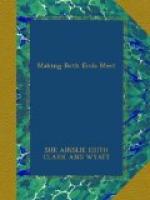At midnight on Christmas eve, as the still crowd of girls walked wanly out of the great store into the brilliant New York street, some one said, “How are you, Kitty?”
She made no reply for a minute. Then she said wretchedly, “Oh—I hope I’ll be dead before the next Christmas.”
V
The sheer and causeless misery this girl endured was, of course, attributable, not only to the long hours and to the standing demanded by her occupation, but to the fact that this occupation was continued at a period when the normal health of great numbers of women demands reasonable quiet and rest.
With a few honorable exceptions[5] it may be said to be the immemorial custom of department stores in this country to treat women employees, in so far as ability to stand and to stand at all seasons goes, exactly as if they were men.
The expert testimony collected by the publication secretary of the National Consumers’ League, Miss Josephine Goldmark, for the brief which obtained the Illinois Ten-Hour Law, gives the clearest possible record of the outlay of communal strength involved in these long hours of standing for women.
Report of “Lancet”
Sanitary Commission on Sanitation in the
Shop. 1892
Without entering upon the vexed question of women’s rights, we may nevertheless urge it as an indisputable physiological fact that, when compelled to stand for long hours, women, especially young women, are exposed to greater injury and greater suffering than men.
British Sessional
Papers. Vol. XII. 1886. Report from
Select
Committee on Shop Hours
Regulation Bill
Witness, W. Abbott, M.D.
“Does their employment
injuriously affect them, as
child-bearing women
in after years?”
“According to all scientific facts, it would do so.”
“And you, as a medical man of a considerable number of years’ experience, would not look to girls who have been worked so many hours in one position as the bearers of healthy, strong children?”
“I should not.”
“Then it naturally
follows, does it not, that this is a very
serious matter in the
interest of the nation as a whole, apart
from the immediate injury
to the person concerned?”
“Yes. As regards the physical condition of the future race.”
British Sessional
Papers. Vol. XII, 1895. Report from
the
Select Committee on
Shops. Early Closing Bill
Witness, Dr. Percy Kidd, M.D., of the University of Oxford, Fellow of the College of Physicians and Member of the College of Surgeons, attached to London Hospital and Brompton, Hospital.
“Would this be a fair way of putting it: It is not the actual work of people in shops, but having to be there and standing about in bad air; it is the long hours which is the injurious part of it?”
“Quite so; the prolonged tension.”




